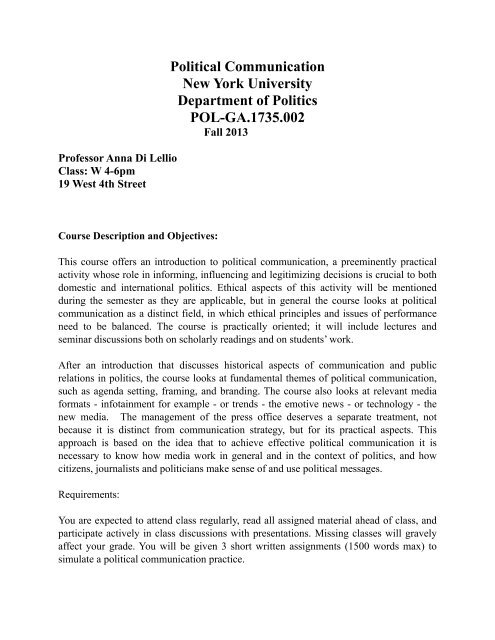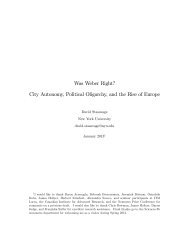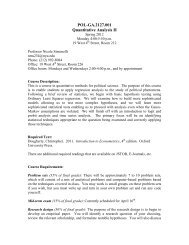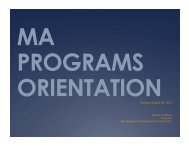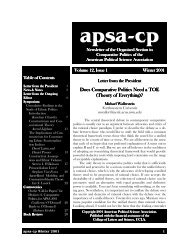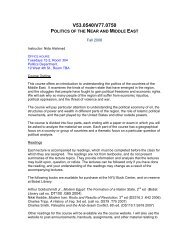2013 Pol Com Syllabus - Department of Politics, New York University
2013 Pol Com Syllabus - Department of Politics, New York University
2013 Pol Com Syllabus - Department of Politics, New York University
You also want an ePaper? Increase the reach of your titles
YUMPU automatically turns print PDFs into web optimized ePapers that Google loves.
Pr<strong>of</strong>essor Anna Di Lellio<br />
Class: W 4-6pm<br />
19 West 4th Street<br />
<strong>Pol</strong>itical <strong>Com</strong>munication<br />
<strong>New</strong> <strong>York</strong> <strong>University</strong><br />
<strong>Department</strong> <strong>of</strong> <strong>Pol</strong>itics<br />
POL-GA.1735.002<br />
Fall <strong>2013</strong><br />
Course Description and Objectives:<br />
This course <strong>of</strong>fers an introduction to political communication, a preeminently practical<br />
activity whose role in informing, influencing and legitimizing decisions is crucial to both<br />
domestic and international politics. Ethical aspects <strong>of</strong> this activity will be mentioned<br />
during the semester as they are applicable, but in general the course looks at political<br />
communication as a distinct field, in which ethical principles and issues <strong>of</strong> performance<br />
need to be balanced. The course is practically oriented; it will include lectures and<br />
seminar discussions both on scholarly readings and on students’ work.<br />
After an introduction that discusses historical aspects <strong>of</strong> communication and public<br />
relations in politics, the course looks at fundamental themes <strong>of</strong> political communication,<br />
such as agenda setting, framing, and branding. The course also looks at relevant media<br />
formats - infotainment for example - or trends - the emotive news - or technology - the<br />
new media. The management <strong>of</strong> the press <strong>of</strong>fice deserves a separate treatment, not<br />
because it is distinct from communication strategy, but for its practical aspects. This<br />
approach is based on the idea that to achieve effective political communication it is<br />
necessary to know how media work in general and in the context <strong>of</strong> politics, and how<br />
citizens, journalists and politicians make sense <strong>of</strong> and use political messages.<br />
Requirements:<br />
You are expected to attend class regularly, read all assigned material ahead <strong>of</strong> class, and<br />
participate actively in class discussions with presentations. Missing classes will gravely<br />
affect your grade. You will be given 3 short written assignments (1500 words max) to<br />
simulate a political communication practice.
Shorter assignments will be given weekly to analyze political speeches, political ads, the<br />
content and the tone <strong>of</strong> coverage <strong>of</strong> political events, with the aim <strong>of</strong> understanding the<br />
perspective <strong>of</strong> both the audience and the communicators. This fall the NYC mayoral<br />
campaign will <strong>of</strong>fer many opportunities for analysis. The assignments will be discussed<br />
in class.<br />
Grading:<br />
Participation, including short weekly assignments: 25%<br />
Three longer assignments: 25% each<br />
Readings:<br />
Most <strong>of</strong> the reading material is available online or in the Bobst Library Electronic<br />
Journals database. I will provide copies <strong>of</strong> chapters from books. I suggest you buy the<br />
following:<br />
Gladstone, Brooke and Josh Neufeld. 2011. The Influencing Machine: Brooke Gladstone<br />
on the Media. Norton and <strong>Com</strong>pany.<br />
<strong>Pol</strong>man, Linda. 2010. The Crisis Caravan. What’s Wrong with Humanitarian Aid?<br />
Metropolitan.<br />
Westen, Drew. 2007. The <strong>Pol</strong>itical Brain: The Role <strong>of</strong> Emotion in Deciding the Fate <strong>of</strong><br />
the Nation. Public Affairs.<br />
Course Schedule:<br />
I. Introduction to the Course<br />
Scenes from Wag the Dog (Barry Levinson 1998) or “how to create a virtual war as<br />
damage control strategy.”
I. The Influencing Machine?<br />
Ewen, Stuart. 1996. PR! A Social History <strong>of</strong> Spin. Basic Books [Chapter 8 “Unseeing<br />
Engineers: Biography <strong>of</strong> an Idea,” pp. 146-173; Ch. 13 “The <strong>New</strong> Deal and the Publicity<br />
<strong>of</strong> Social Enterprise,” pp. 247-287]<br />
Gladstone, Brooke and Josh Neufeld. 2011. The Influencing Machine: Brooke Gladstone<br />
on the Media. Norton and <strong>Com</strong>pany.<br />
Morris, Errol. 2011. Believing is Seeing (Observations on the Mysteries <strong>of</strong> Photography)<br />
Penguin: Chapter 4 “Photography and Reality/Captioning, Propaganda and Fraud,” pp.<br />
123-220<br />
II. The Influencing Old Media<br />
Druckman, James N. 2000. “The Power <strong>of</strong> Television Images: The First Kennedy-Nixon<br />
Debate Revisited.” Journal <strong>of</strong> <strong>Pol</strong>itics 65 (May): 559-71.<br />
-----------------------. 2005. “Media Matter: How <strong>New</strong>spapers and Television <strong>New</strong>s Cover<br />
Campaigns and Influence Voters,” <strong>Pol</strong>itical <strong>Com</strong>munication, Vol. 22: 463-481.<br />
Groeling, Tim. 2008. “Who’s the Fairest <strong>of</strong> them All? An Empirical Test for Partisan Bias<br />
on ABC, CBS, NBC, and Fox <strong>New</strong>s.” Presidential Studies Quarterly.<br />
III. The Gamesmanship <strong>of</strong> <strong>Com</strong>munication<br />
Jamieson, Kathleen Hall. 1992. Dirty <strong>Pol</strong>itics. Deception, Distraction, and Democracy<br />
Oxford <strong>University</strong> Press [Part IV. “Accountability, Engagement and Democracy,” pp.<br />
203-266]<br />
Westen, D. 2007. The <strong>Pol</strong>itical Brain: The Role <strong>of</strong> Emotion in Deciding the Fate <strong>of</strong> the<br />
Nation. Public Affairs.<br />
Film: The Boogie Man: The Lee Atwater Story (Stefan Forbes 2007)
IV. Agenda Setting<br />
David Plouffe The Audacity to Win. The Inside Story and Lessons <strong>of</strong> Barak Obama;s<br />
Historic Victory, Viking, 2009 [“Building Block,” pp. 55-83; “It’s the Economy, Stupid,”<br />
323-342, and “Plumbers and Radicals,” 342-361]<br />
Film: The War Room (Chris Hegedus 1993)<br />
V. Framing the <strong>New</strong>s<br />
Brewer, Paul R. 2002. “Framing, Value Words, and Citizens’ Explanations <strong>of</strong> Their Issue<br />
Opinions,” <strong>Pol</strong>itical <strong>Com</strong>munication, Vol. 19: 303-316<br />
Dhavan, Shah, Watts Mark, Domke David and Fan David. 2002. “<strong>New</strong>s Framing and<br />
Cueing <strong>of</strong> Issue Regimes. Explaining Clinton’s Public Approval in Spite <strong>of</strong> Scandal,<br />
Public Opinion Quarterly (66): 339-370.<br />
Fung Archon, David Weil, Mary Graham and Elena Fagotto. 2004. The <strong>Pol</strong>itical<br />
Economy <strong>of</strong> Transparency: What makes disclosure policies effective? John Kennedy<br />
School <strong>of</strong> Government Harvard.<br />
Johnson Peter T. 1993. “How I Turned a Critical Public into a Useful Consultant.”<br />
Harvard Business Review, Jan-Feb:138-146.<br />
Lawrence, Regina. 2000. “Game-Framing the Issues: Tracking the Strategy Frame in<br />
Public <strong>Pol</strong>icy <strong>New</strong>s,” <strong>Pol</strong>itical <strong>Com</strong>munication, Vol. 17: 93-114.<br />
Luther, Catherine A. and Xiang Zhou. 2005. “Within the Boundaries <strong>of</strong> <strong>Pol</strong>itics: <strong>New</strong>s<br />
Framing <strong>of</strong> SARS in China and the United States,” Journalism and Mass <strong>Com</strong>munication<br />
Quarterly, Vol. 82 (4): 857-872.
VI. Framing the candidates (Branding)<br />
Carlin, Diana B. and Kelly L. Winfrey. 2009. “Have You <strong>Com</strong>e a Long Way, Baby?<br />
Hillary Clinton, Sarah Palin, and Sexism in 2008 Campaign Coverage,” <strong>Com</strong>munication<br />
Studies, vol. 60 (4): 326-343.<br />
Fahey, Anna Cornelia. 2007. “French and Feminine: Hegemonic Masculinity and the<br />
Emasculation <strong>of</strong> John Kerry in the 2004 Presidential Race,” Critical Studies in Media<br />
<strong>Com</strong>munication, Vol. 24 (2): 132-150<br />
Scammell, Margaret. 2007. “<strong>Pol</strong>itical Brands and Consumer Citizens: The Rebranding <strong>of</strong><br />
Tony Blair” Annals <strong>of</strong> the American Academy <strong>of</strong> <strong>Pol</strong>itical and Social Science, Vol. 611<br />
(May): 176-192.<br />
Film: Our Brand is Crisis (Rachel Boynton 2005)<br />
VII. The Press Office<br />
Siegal, Allan (Edelman Family Fellow, Former Assistant Managing Editor, <strong>New</strong> <strong>York</strong><br />
Times) 2007. Secrets about Secrets: The Backstage Conversations between Press and<br />
Government. Joan Shorenstein Center on the Press, <strong>Pol</strong>itics and Public <strong>Pol</strong>icy<br />
Working Paper Series<br />
Sullivan, Marguerite H. A Responsible Press Office<br />
U.S. <strong>Department</strong> <strong>of</strong> State Office <strong>of</strong> International Information Programs<br />
http://usinfo.state.gov<br />
“Live from the White House: Making the <strong>New</strong>s,” International Journal <strong>of</strong> the Press/<br />
<strong>Pol</strong>itics 16 (2) 2011: 272-283.<br />
VIII. Importance <strong>of</strong> infotainment<br />
Baird Julia. 2005. S<strong>of</strong>t Power and Hard Views: How American <strong>Com</strong>mentators are<br />
Spreading over the World’s Opinion Pages. The Joan Shorenstein Center on the Press,<br />
<strong>Pol</strong>itics and Public <strong>Pol</strong>icy Working Paper Series.
Matthew A. 2005. “Talking the Vote: Why Presidential Candidates Hit the Talk Show<br />
Circuit” American Journal <strong>of</strong> <strong>Pol</strong>itical Science, Vol. 49, No. 2 (Apr): 213-234<br />
Roderick Hart and Johanna Harteliu. 2007. “The <strong>Pol</strong>itical Sins <strong>of</strong> Jon Stewart,” Critical<br />
Studies in Media <strong>Com</strong>munication, vol. 24, 3, August: 263-272<br />
Bennett, Lance W. “Critical Forum. Relief in Hard Times: A Defense <strong>of</strong> Jon Stewart’s<br />
<strong>Com</strong>edy in an Age <strong>of</strong> Cynicism” ibid.<br />
IX. Persuasion Power <strong>of</strong> the Emotive media<br />
Gilboa, Eytan. 2005. “ The CNN Effect: The Search for a <strong>Com</strong>munication Theory <strong>of</strong><br />
International Relations,” <strong>Pol</strong>itical <strong>Com</strong>munication, Vol. 22: 27-44.<br />
Gourevitch. Philip. 2010. “Alms Dealers.” The <strong>New</strong> <strong>York</strong>er. October 11.<br />
Johansen, Morgen S. and Mark R. Joslyn. 2008. “<strong>Pol</strong>itical Persuasion During Times <strong>of</strong><br />
Crisis: The Effects <strong>of</strong> Education and <strong>New</strong>s Media on Citizens’ Factual Information About<br />
Iraq,” Journalism and Mass <strong>Com</strong>munication Quarterly, Vol. 85 (3): 591-608<br />
<strong>Pol</strong>man, Linda. 2010. The Crisis Caravan. What’s Wrong with Humanitarian Aid?<br />
Metropolitan.<br />
Rothmyer, Karen (Contributing Editor, The Nation). 2011. They Wanted Journalists to<br />
Say ‘Wow’ How NGOs Affect U.S. Media Coverage <strong>of</strong> Africa. Joan Shorenstein Center on<br />
the Press, <strong>Pol</strong>itics and Public <strong>Pol</strong>icy Discussion Paper Series<br />
Zelizer Barbie. 2005. Death in Wartime: Photographs and the “Other War” in<br />
Afghanistan. The Joan Shorenstein Center on the Press, <strong>Pol</strong>itics and Public <strong>Pol</strong>icy<br />
Working Paper Series.<br />
X. <strong>New</strong> Media<br />
Peter Maas, “How Laura Poitras Helped Snowden Spill His Secrets” The <strong>New</strong><strong>York</strong> Times<br />
Magazine, August 13, <strong>2013</strong>
http://www.nytimes.com/<strong>2013</strong>/08/18/magazine/laura-poitras-snowden.html?_r=0<br />
“Komen learns power <strong>of</strong> social media: Facebook, Twitter fueled fury” The Los Angeles<br />
Times, February 3, 2012<br />
http://latimesblogs.latimes.com/nationnow/2012/02/facebook-twitter-fueled-furyagainst-in-susan-g-komen-for-the-cure-.html<br />
Sean Sullivan, “What Twitter has meant for politics (and what it hasn’t),” The<br />
Washington Post March 21 <strong>2013</strong><br />
http://www.washingtonpost.com/blogs/the-fix/wp/<strong>2013</strong>/03/21/what-twitter-has-meantfor-politics-and-what-it-hasnt/<br />
Bai Matt. 2007. The Argument: Billionaires, Bloggers, and the Battle to Remake<br />
Democratic <strong>Pol</strong>itics Penguin Press [pp. 23-48; 67-91 and 94-122]<br />
Baum, Matthew and Tim Groeling. 2008. “<strong>New</strong> Media and the <strong>Pol</strong>arization <strong>of</strong> American<br />
<strong>Pol</strong>itical Discourse,” <strong>Pol</strong>itical <strong>Com</strong>munication, 25: 345-365.<br />
Chadwick, Andrew. 2011. “The <strong>Pol</strong>itical Information Cycle in a Hybrid <strong>New</strong>s System:<br />
The British Prime Minister and the “Bullygate” Affairs” International Journal <strong>of</strong> Press/<br />
<strong>Pol</strong>itics 16 (1): 3-29<br />
Geer, John (Distinguished Pr<strong>of</strong>essor <strong>of</strong> <strong>Pol</strong>itical Science, Vanderbilt <strong>University</strong>). 2010<br />
Fanning the Flames: The <strong>New</strong>s Media’s Role in the Rise <strong>of</strong> Negativity in Presidential<br />
Campaigns. Joan Shorenstein Center on the Press, <strong>Pol</strong>itics and Public <strong>Pol</strong>icy<br />
Discussion Paper Series<br />
Nyaira, Sandra (Zimbabwean <strong>Pol</strong>itical Journalist) 2009. Mugabe’s Media War: How <strong>New</strong><br />
Media Help Zimbabwean Journalists Tell Their Story. Shorenstein Center on the Press,<br />
<strong>Pol</strong>itics and Public <strong>Pol</strong>icy Discussion Paper Series<br />
O’Connor, Rory (Sagan Fellow, President <strong>of</strong> Globalvision). 2009. Word <strong>of</strong> Mouse:<br />
Credibility, Journalism and Emerging Social Media. Joan Shorenstein Center on the<br />
Press, <strong>Pol</strong>itics and Public <strong>Pol</strong>icy. Discussion Paper Series


